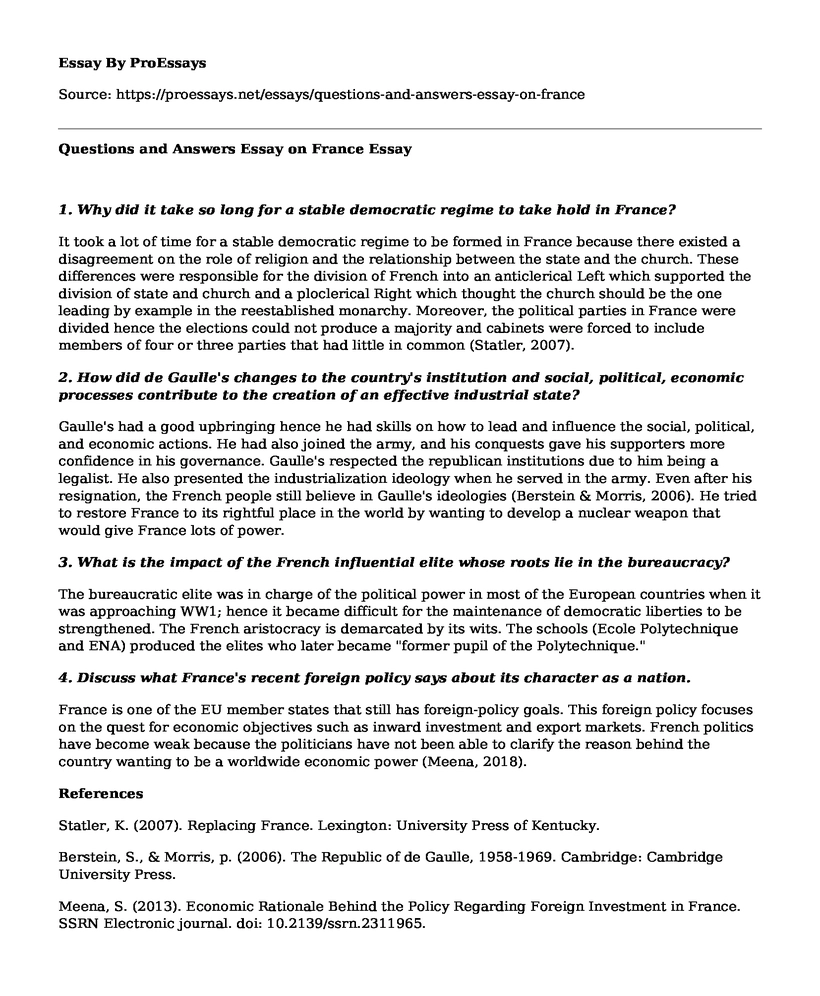1. Why did it take so long for a stable democratic regime to take hold in France?
It took a lot of time for a stable democratic regime to be formed in France because there existed a disagreement on the role of religion and the relationship between the state and the church. These differences were responsible for the division of French into an anticlerical Left which supported the division of state and church and a ploclerical Right which thought the church should be the one leading by example in the reestablished monarchy. Moreover, the political parties in France were divided hence the elections could not produce a majority and cabinets were forced to include members of four or three parties that had little in common (Statler, 2007).
2. How did de Gaulle's changes to the country's institution and social, political, economic processes contribute to the creation of an effective industrial state?
Gaulle's had a good upbringing hence he had skills on how to lead and influence the social, political, and economic actions. He had also joined the army, and his conquests gave his supporters more confidence in his governance. Gaulle's respected the republican institutions due to him being a legalist. He also presented the industrialization ideology when he served in the army. Even after his resignation, the French people still believe in Gaulle's ideologies (Berstein & Morris, 2006). He tried to restore France to its rightful place in the world by wanting to develop a nuclear weapon that would give France lots of power.
3. What is the impact of the French influential elite whose roots lie in the bureaucracy?
The bureaucratic elite was in charge of the political power in most of the European countries when it was approaching WW1; hence it became difficult for the maintenance of democratic liberties to be strengthened. The French aristocracy is demarcated by its wits. The schools (Ecole Polytechnique and ENA) produced the elites who later became "former pupil of the Polytechnique."
4. Discuss what France's recent foreign policy says about its character as a nation.
France is one of the EU member states that still has foreign-policy goals. This foreign policy focuses on the quest for economic objectives such as inward investment and export markets. French politics have become weak because the politicians have not been able to clarify the reason behind the country wanting to be a worldwide economic power (Meena, 2018).
References
Statler, K. (2007). Replacing France. Lexington: University Press of Kentucky.
Berstein, S., & Morris, p. (2006). The Republic of de Gaulle, 1958-1969. Cambridge: Cambridge University Press.
Meena, S. (2013). Economic Rationale Behind the Policy Regarding Foreign Investment in France. SSRN Electronic journal. doi: 10.2139/ssrn.2311965.
Cite this page
Questions and Answers Essay on France . (2022, Nov 24). Retrieved from https://proessays.net/essays/questions-and-answers-essay-on-france
If you are the original author of this essay and no longer wish to have it published on the ProEssays website, please click below to request its removal:
- Essay Example: Antitrust Legislation
- Paper Example on Government Agencies and Transportation
- Rhetorical Essay on Student Truancy
- Supreme Court Rulings and Its Impact on America Essay
- Special Purpose Districts in Texas - Essay Sample
- Essay Sample on Elements of Government Contracting and Business Practices
- Essay Example on School Uniforms: An Ongoing Debate in the Contemporary World







